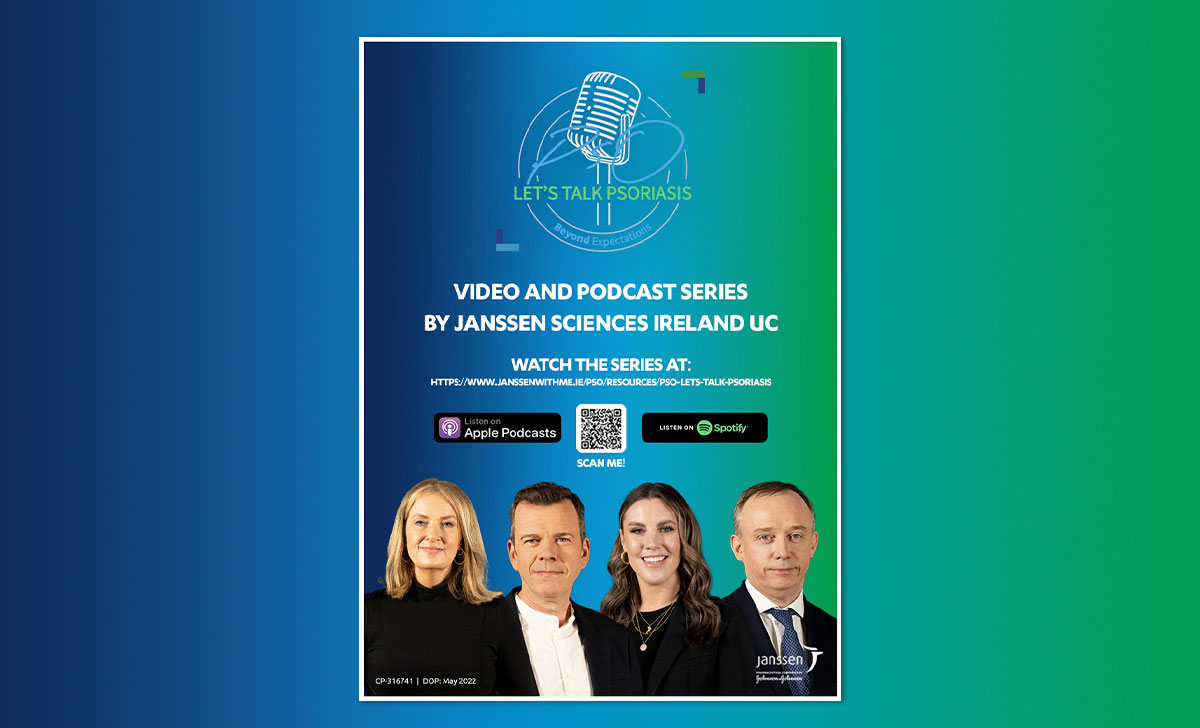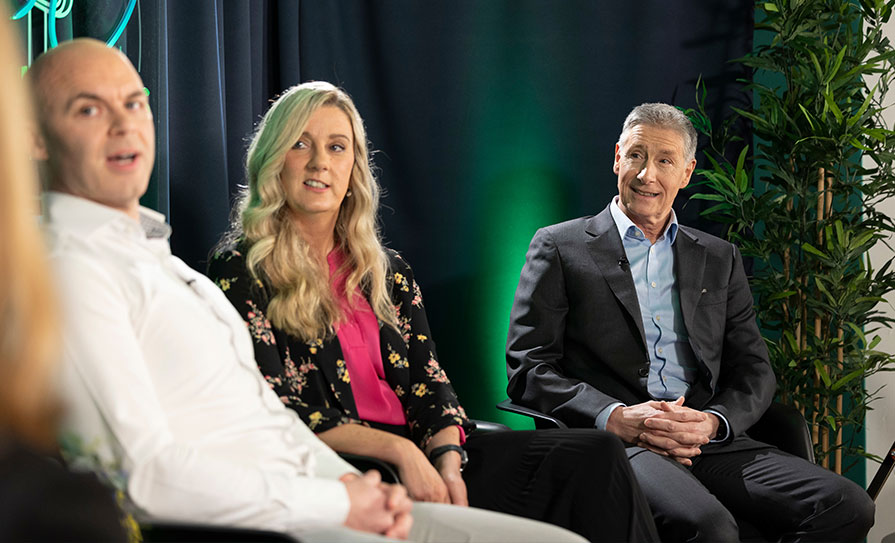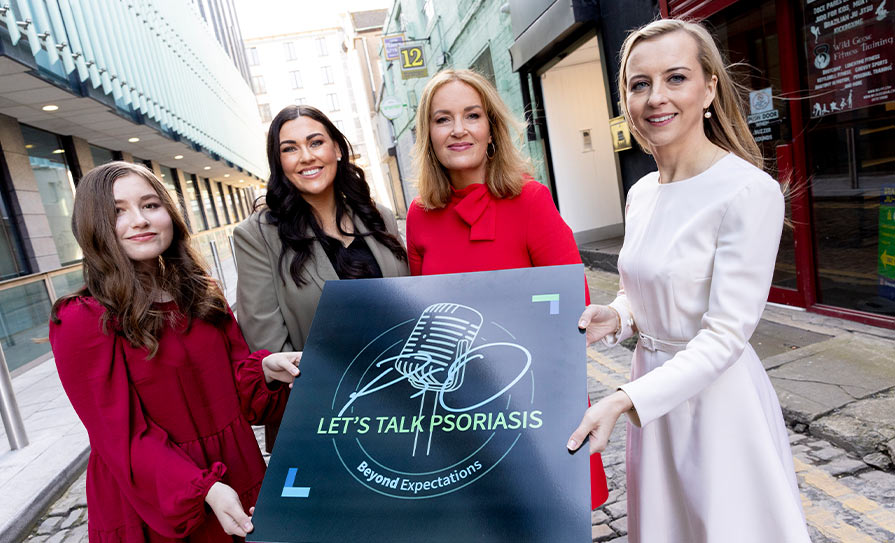Messy tar, ineffectual creams, and long sleeves – the treatment of psoriasis has come a long way. Now recognised as an autoimmune condition with systemic effects, there is a plethora of sophisticated medications available that can transform the skin – and life – of even those with the most severe form of the disease.
But with almost 40,000 people awaiting access to specialist care across Ireland – and 30 per cent of these waiting 12 months or more – many patients often still have more questions than answers when it comes to their psoriasis.1
A new video and podcast series from Janssen Sciences Ireland UC called PsO Let’s Talk Psoriasis aims to support and empower those people living with psoriasis as they await access to specialist dermatology care. In the four-part series, healthcare professionals are joined by people with psoriasis and psoriatic arthritis as they explore multiple aspects of living with and managing the conditions.
In line with other chronic diseases, a goal of psoriasis management is to empower patients to self-manage their condition and share in decision-making with their healthcare professional.2,3 The new series acts as a powerful resource, allowing those with psoriasis to access expert advice and also hear how their peers have coped with their diagnosis.
The reality is that while a GP can usually easily diagnose psoriasis from the tell-tale red scaly patches of skin, those with moderate-to-severe forms of the condition will require a holistic treatment plan delivered in a secondary care facility, says Prof Brian Kirby.4
The consultant dermatologist at St Vincent’s University Hospital (SVUH) explains in the first episode of the new series that while a diagnosis of psoriasis can feel like a setback in terms of health, what it represents is an opportunity to get in control of the condition and avail of the new therapies and advances that have transformed the treatment landscape.
The first step is learning more about the condition, what it is and what causes it. Kirby explains that the disease can often be triggered by an illness or infection – a sore throat, perhaps.5 “In about half of people this trigger can be identified,” he says. The immune system is upregulated to fight the throat infection, but the excess immune activity continues, manifesting itself in the skin. This immune overactivity means skin cells proliferate more rapidly – seven times quicker than normal – leaving the patient with thick hard scaly patches of skin.6 “The inflammation involved means it is often red, itchy, and uncomfortable,” he notes. There is a genetic component to the disease and about one-in-three of those who develop psoriasis will have someone in their immediate family with the condition.5

And while psoriasis can be classified as mild, moderate, or severe, Prof Kirby stresses that the impact is highly individual. “It’s not about the amount of psoriasis you have – if you have a small amount, but it’s on your face and you are 15 and you won’t go to school, then that’s severe…. Skin is such an obvious social organ. Diabetes or high blood pressure are typically invisible.”
Unsurprisingly, the mental health implications of a psoriasis diagnosis are not insignificant, but Kirby notes that the condition will likely have been impacting patients’ lives long before that.7 “The key in most newly-diagnosed people should be a sense of hope that this will be treated successfully – and it will be, for almost everybody we see. It’s about getting the right treatment at the right time.”
While people await access to that treatment, however, there will be an adjustment period. That’s according to Dr Paul D’Alton, a clinical psychologist and Head of the Department of Psychology at SVUH. He says that accepting a diagnosis of psoriasis depends on the life stage of the person concerned.
“Those at a younger age will still be coming to terms with their bodies and throwing psoriasis into the mix can have a huge impact,” he admits, saying that the adjustment period can last for up to six months. “This is a time of learning to live with a condition that really does interrupt life in all sorts of ways. It’s about managing it as best you can and not letting it take over your whole life.”
D’Alton acknowledges, however, that living with psoriasis can be stressful and stress can in turn cause flare-ups of the condition.7 This vicious cycle can be difficult to break, especially as people with psoriasis can isolate themselves, tending to pull back from family, friends, and work colleagues, even though they need support more than ever.
“In any crisis what’s most important is our social support,” he states, adding that this can often be because of the perceived shame and embarrassment associated with the condition. “Shame loves silence.”
In the first episode of the series, photographer and fashion influencer, Damien Broderick describes this shame. Diagnosed at 18 with severe psoriasis, he admits it had a huge impact on him. Broderick speaks of his embarrassment at how he looked and how his psoriasis affected his work, playing sport, and intimacy in his relationships. “People try to be supportive, but you feel like they don’t understand,” he says.
Psoriasis can occur at any age; while it most commonly appears during the teen years, or when someone is in their 50s, Kirby notes he has seen it in newborns and even an 87-year-old for the first time.4 No matter what age the patient is, appropriate clinical treatment and psychological support go hand-in-hand, he says.
“We have a spectrum of treatments now. It isn’t like 40 years ago when treatments really weren’t available. In newly-diagnosed patients, indeed the first step is to reassure. The belief there is no cure is something of a misperception. Many chronic medical conditions aren’t curable, such as asthma, but people have a perfectly normal life with them and this is the goal in psoriasis.”
This holistic approach to treatment involves a thorough exploration of any “obvious environmental factors” that could be making the condition worse. Stress is one of those, but alcohol consumption and smoking are other triggers for psoriasis.5,8 They also may limit the effectiveness of any treatment. Weight management and exercise will also be beneficial.9
Topical treatments such as steroids may be given for milder forms of the disease, but these will only be used for a fixed period of time – a few weeks at most, Kirby explains. Ultraviolet light is also an effective therapy, but as it necessitates thrice-weekly trips to the centre while undergoing treatment, it only suits a minority of patients who live relatively nearby.10 The results can be impressive but challenging to maintain, Kirby says: “We will get people clear most of the time but then the next challenge is to keep them clear.”11
If UV light does not work, then systemic medication such as oral methotrexate or injectable biologic agents. There are currently a total of 11 biologic therapies licensed and indicated for psoriasis, as well as other traditional systemic agents such as methotrexate.10 “In 2022 we will find the right treatment for 99 per cent of people. This is not something you will have to live with on a long-term basis, specialist care has moved on dramatically in the last 20 years.”
Kirby also points out that the patient’s experience and expectation of treatment has changed. “People used to spend two to three hours a day looking after their skin and that’s not the aim of treatment in 2022. The disease should have a minimal impact on your life and that means the treatment should have a minimal impact on your life too.”
Indeed, the main barrier to successful management of psoriasis is the paucity of dermatology services across Ireland, with thousands waiting for an appointment for more than 12 months.1 Given that the patient may have been on a waiting list for an extended period of time, D’Alton advised it is important to take practical steps to prepare for the specialist appointment, perhaps drawing up a list of questions, and taking a family member or friend along. “The doctor cannot read your mind and there will be a lot of information to take in.”
The video and podcast series also helps to debunk common myths and misperceptions surrounding the condition – for example, while using an emollient on the skin is good, covering it in cling film will not offer any additional benefit.10 Similarly, an over-the-counter antihistamine will not help with the itching often associated with psoriasis, nor will a so-called “anti-inflammatory diet”.
PsO Let’s Talk Psoriasis is available free of charge online with four episodes released on a weekly basis throughout May 2022, at www.janssenwithme.ie/pso/resources/pso-lets-talk-psoriasis. The podcast audio versions are also available wherever you access your podcasts.
References
- Outpatient by Speciality Care as at 24/02/2022, The National Treatment Purchase Fund. Available at: www.ntpf.ie/home/ pdf//2022/02/nationalnumbers/out-patient/National02. pdf. (last accessed March 2022)
- HSE. Psoriasis self-management. Available at: www. hse.ie/conditions/psoriasis/ self-management/ (last accessed May 2022)
- Shared decision making in psoriasis: A systematic review of quantitative and qualitative studies. Available at: https://pubmed. ncbi.nlm.nih.gov/30324563/ (last accessed May 2022)
- AJMC. Psoriasis and psoriatic arthritis overview. Available at: www.ajmc.com/view/psoriasis-and-psoriatic-arthritis-overview (last accessed April 2022)
- National Psoriasis Foundation. Causes and triggers. Available at: www.psoriasis.org/causes/ (last accessed May 2022)
- Psoriasis genetics: Breaking the barrier. Available at: www.ncbi.nlm.nih.gov/pmc/ articles/PMC2957827/ (last accessed May 2022)
- Sahi FM, Masood A, Danawar NA, Mekaiel A, Malik BH. Association between psoriasis and depression: A traditional review. Cureus. 2020;12(8):e9708. Published 2020 Aug 13. doi: 10.7759/cureus.9708
- National Psoriasis Foundation. Smoking and psoriasis. Available at: www.psoriasis.org/ advance/smoking-and-psoriasis/ (last accessed May 2022)
- Jensen P, Skov L. Psoriasis and obesity. Dermatology. 2016;232:633–639. doi: 10.1159/000455840
- Lapolla, Whitney et al. A review of phototherapy protocols for psoriasis treatment. Journal of the American Academy of Dermatology vol. 64,5 (2011): 936-49. doi: 10.1016/j.jaad.2009.12.054
- NHS. Psoriasis treatment. Available at: www.nhs.uk/ conditions/psoriasis/treatment/?msclkid=a73626f9c79b11ec8c1cdd3227db9fd5 (last accessed April 2022)












Leave a Reply
You must be logged in to post a comment.